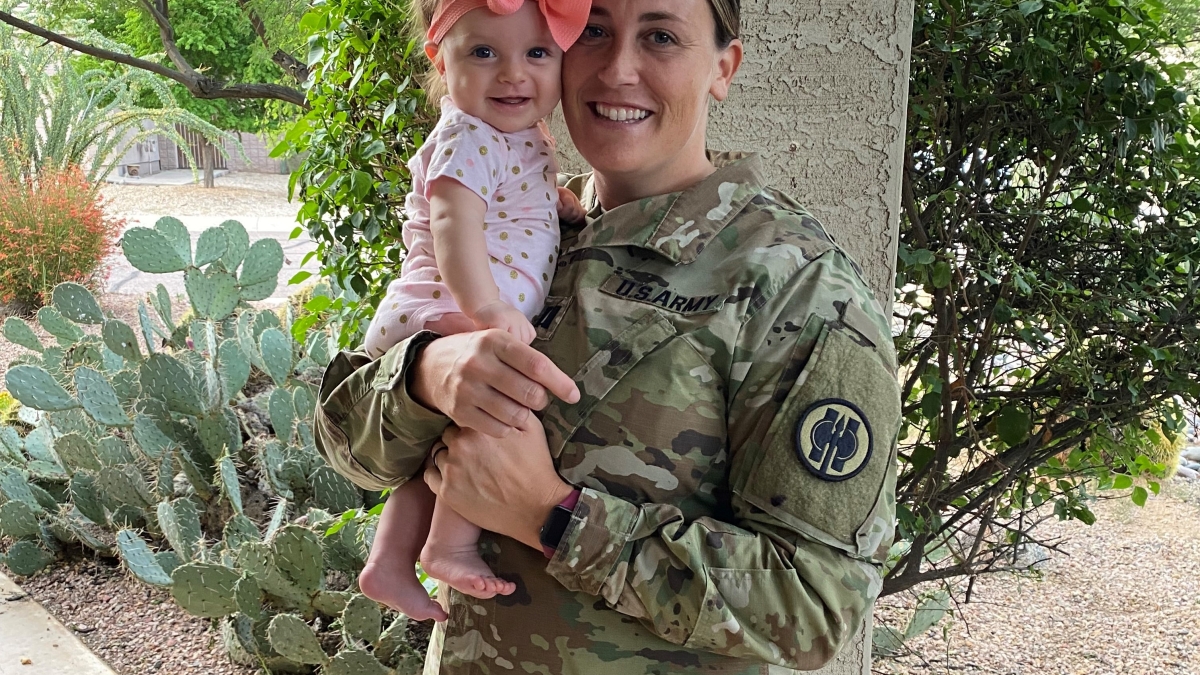Nation's response to pandemic led grad to seek emergency management career

Rachel Henderson, fall 2021 Outstanding Graduate, Interdisciplinary Programs, and her daughter Leia.
Editor's note: This story is part of a series of profiles of notable fall 2021 graduates.
As COVID-19 first began its assault on the nation’s health in early 2020, Rachel Henderson observed how those in charge dealt with the oncoming pandemic.
“I watched many in leadership positions struggle as to what actions and decisions would be best for the health and safety of our nation as it faced an emergency pandemic,” said Henderson, who is receiving a Master of Arts degree in emergency management and homeland security. She is the fall 2021 Outstanding Graduate in Interdisciplinary Programs in the Watts College of Public Service and Community Solutions.
“I knew it was my duty to be better prepared and educated when faced with an unknown enemy for my military career. So I researched and found ASU’s emergency management and homeland security degree program that fit best,” said Henderson, a captain in the United States Army military police stationed in Glendale, Arizona.
Arizona State University’s emergency management and homeland security program offers a degree with an excellent reputation, she said. Henderson was able to complete the degree online while working full time and becoming a new mom. She and her husband, Maurice, have a 6-month-old daughter, Leia.
Henderson also earned a bachelor’s degree in law and society from Purdue University and a master’s degree in sociology from Auburn University.
During her time as an ASU student, Henderson said she was surprised to learn how many ways existed to build a resilient community beyond only following a provided guide or checklist.
“Through our group discussion boards and open debate forums, I learned plenty more from others’ experiences than I did from an assigned textbook,” said Henderson, whose hometown of Blue Bell, Pennsylvania, is in the Philadelphia area.
Henderson said she plans to remain on active duty in the Army, where she has served 10 years, and use the knowledge from her degree program to enrich her critical decision-making choices.
“Following my military career, I would like to work with another role in the federal government that works to better prepare, plan and defend our nation’s assets and resources in emergency situations,” she said.
Henderson advised those still in school to do their best to understand opposing viewpoints. “If you keep an open mind on topics that revolve around change, you can build upon ideas, and also help others around you do the same.”
Read on for more of what Henderson learned while pursuing her ASU degree:
Question: Which professor(s) taught you the most important lesson while at ASU?
Answer: Professor Malcolm Goggin had the most interactive courses. His material, readings, assignments and discussion boards broadened my and classmates’ ideas and viewpoints. I thoroughly enjoyed his teaching.
Q: What was your favorite spot to study, meet friends or to just think about life?
A: My best place to study for exams and chapter-long readings was by my pool. I was fortunate enough to be feet away from air conditioning when it would get too hot, but the vitamin D from the Arizona sunshine gave me all the energy to enjoy learning while reading.
Q: If someone gave you $40 million to solve one problem on our planet, what would you tackle?
A: I would tackle our nation’s health crisis. During the unknown days of the pandemic, people were waiting for the professionals on the news to tell them what and how to treat their own bodies to avoid the coronavirus. If average citizens were to listen and follow that same way on how to eat healthy, exercise regularly and care for our bodies, we would have a lot less of a high-risk population when the next pandemic hits. A serious push, through funding and information sharing, to recommend healthy lifestyles, would definitely be how I’d spend my $40 million.
More Arts, humanities and education

Pen Project helps unlock writing talent for incarcerated writers
It’s a typical Monday afternoon and Lance Graham is on his way to the Arizona State Prison in Goodyear.It’s a familiar scene.…

Phoenix civil rights activists highlighted in ASU professor’s latest book
As Phoenix began to grow following WWII, residents from other parts of the country moving to the area often brought with them Jim…

Happy mistake: Computer error brings ASU Online, on-campus students together to break new ground in research
Every Thursday, a large group of students gathers in the Teotihuacan Research Laboratory (TeoLab) in the basement of the…

